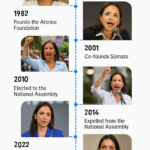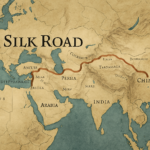
Aung San Suu Kyi, a figure of remarkable prominence in Myanmar and on the global stage, has lived a life intricately intertwined with her nation’s tumultuous history. In this exploration, we delve into 25 historical facts and numerical trivia that illuminate her journey, from her birth into a family of political luminaries to her unwavering commitment to democracy and human rights. As we traverse through her education, marriage, and pivotal roles in Myanmar’s politics, we also consider her international accolades and the complexities of her political legacy. Aung San Suu Kyi’s story is one of deep personal sacrifice, resilience, and the ever-evolving nature of leadership in a changing world.
Birth Date: Aung San Suu Kyi was born on June 19, 1945, in Rangoon, Burma (now Yangon, Myanmar). Her birth marked the beginning of a life that would be closely entwined with her nation’s tumultuous political journey. Born into a family of political prominence, with her father being General Aung San, the founding father of modern Myanmar, she inherited a legacy of national leadership.
Family Background: Aung San Suu Kyi’s family background was steeped in Myanmar’s political history. Her father, General Aung San, played a pivotal role in securing Myanmar’s independence from British colonial rule. Her mother, Khin Kyi, was a prominent diplomat. Aung San Suu Kyi’s lineage connected her to the country’s struggle for self-determination, inspiring her own dedication to democracy and human rights.
Education: Aung San Suu Kyi pursued her education in renowned institutions, including the University of Oxford, where she earned a Bachelor of Arts degree in Philosophy, Politics, and Economics (PPE). Her academic achievements and intellectual rigor provided her with a strong foundation for her later political endeavors.
Marriage: In 1972, she married Michael Aris, a British scholar specializing in Tibetan culture. Their union would span many years and continents, serving as a testament to their enduring love and commitment, despite the geographical distance imposed by her political activism.
Return to Myanmar: Aung San Suu Kyi returned to Myanmar in 1988, originally to care for her ailing mother. However, the political climate in Myanmar was undergoing a transformation, leading her to become deeply involved in the pro-democracy movement. Her return marked a significant turning point in her life and the nation’s history.
Leader of the NLD: In 1988, Aung San Suu Kyi co-founded the National League for Democracy (NLD) and assumed a leadership role within the party. The NLD’s formation was a pivotal moment in Myanmar’s political landscape, providing a platform for democratic change in a nation that had long been under authoritarian rule.
Nobel Peace Prize: In 1991, Aung San Suu Kyi was awarded the Nobel Peace Prize for her unwavering commitment to non-violent struggle for democracy and human rights in Myanmar. This prestigious recognition placed her on the global stage and drew attention to the struggle for democracy in her homeland.
House Arrest: Aung San Suu Kyi’s courage and dedication to the pro-democracy movement led to her house arrest by the military junta in Myanmar. She spent a total of 15 years under house arrest between 1989 and 2010, enduring personal sacrifice and hardship while remaining a symbol of resistance.
Release in 2010: In November 2010, she was released from house arrest, a moment celebrated by supporters worldwide. Her release represented a significant step in Myanmar’s transition towards a more open and democratic society.
Election in 2012: Aung San Suu Kyi contested and won a by-election in 2012, marking her formal entry into the Myanmar Parliament. Her election to public office was a profound moment, signifying her transition from a symbol of resistance to a key political figure in Myanmar’s evolving political landscape.
Presidential Ambitions: Despite her electoral victories, Aung San Suu Kyi was constitutionally barred from becoming president in Myanmar due to her family’s foreign ties. This limitation represented a significant political challenge as she navigated the country’s complex political landscape.
State Counsellor: To circumvent the constitutional restrictions, the position of “State Counsellor” was created in Myanmar in 2016, with Aung San Suu Kyi assuming this role. As State Counsellor, she effectively led the government, serving as a de facto leader. This development underscored her enduring influence in Myanmar’s political arena.
Rohingya Crisis: Aung San Suu Kyi’s international reputation faced a significant decline due to her handling of the Rohingya crisis in Rakhine State. The Myanmar military faced accusations of ethnic cleansing and human rights violations against the Rohingya minority. Aung San Suu Kyi’s response to these allegations and the humanitarian crisis was widely criticized.
NLD’s Victory in 2020: In the 2020 Myanmar general election, the National League for Democracy (NLD) won a resounding victory, securing a significant majority of parliamentary seats. The election marked a continuation of Aung San Suu Kyi’s party’s dominance in the country’s political landscape, reflecting the enduring support for her leadership.
Coup in 2021: Aung San Suu Kyi’s political career took a dramatic turn when the Myanmar military staged a coup in February 2021, detaining her and other political leaders. The coup disrupted the country’s democratic transition and led to widespread protests and international condemnation.
Saffron Revolution: In 2007, Aung San Suu Kyi supported and joined the Saffron Revolution, a series of protests led by Buddhist monks against the military junta. The movement demonstrated her continued commitment to non-violent resistance and democratic reform.
Honorary Canadian Citizenship: In 2007, Canada granted Aung San Suu Kyi honorary Canadian citizenship in recognition of her efforts for democracy and human rights. This honor represented international acknowledgment of her extraordinary contributions to the global struggle for democracy.
Height and Weight: Aung San Suu Kyi’s physical attributes include a height of approximately 5 feet 4 inches (163 cm) and an estimated weight of around 119 pounds (54 kg). These details provide a glimpse into her personal characteristics.
Awards and Honors: Along with the Nobel Peace Prize, Aung San Suu Kyi has received numerous awards and honors, including the Sakharov Prize for Freedom of Thought from the European Parliament and the U.S. Congressional Gold Medal. These accolades highlight the international recognition of her enduring efforts for democracy and human rights.
International Activism: Aung San Suu Kyi’s steadfast commitment to non-violent resistance and democratic principles made her an international symbol of peaceful activism against authoritarian rule. Her life’s work has inspired countless activists and leaders around the world who share her dedication to democratic values and human rights.
Burmese Language Skills: Aung San Suu Kyi is well-known for her proficiency in the Burmese language. Her ability to communicate effectively in the native language of Myanmar has been an essential aspect of her political career. It allows her to connect with the Burmese people and convey her messages directly and persuasively.
Non-Violent Resistance: Throughout her life, Aung San Suu Kyi has been a staunch advocate of non-violent resistance. This commitment to peaceful methods of achieving political change aligns with her principles and the legacy of her father, General Aung San. Her dedication to non-violence has been a defining feature of her political philosophy.
Dissolution of Marriage: Aung San Suu Kyi’s marriage to Michael Aris faced challenges due to her long periods of house arrest and political activism in Myanmar. The couple’s decision to stay married and maintain their relationship despite the distance imposed by political circumstances is a testament to their love and enduring commitment.
United Nations Role: Aung San Suu Kyi served as Myanmar’s ambassador to the United Nations from 2012 to 2016. In this role, she represented her country on the international stage, contributing to diplomatic relations and global discussions on key issues, although her effectiveness was constrained by Myanmar’s complex political dynamics.
Political Legacy: Aung San Suu Kyi’s political legacy is a topic of considerable debate and controversy. Her early years as a pro-democracy icon were followed by a period of leadership in Myanmar’s government, during which she faced criticism for her handling of issues such as the Rohingya crisis. Her political journey reflects the complexities and challenges of governing in a nation transitioning from decades of authoritarian rule to democracy.









